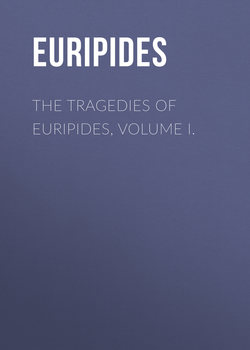Читать книгу The Tragedies of Euripides, Volume I. - Euripides - Страница 6
HECUBA
HECUBA
HECUBA. CHORUS
ОглавлениеHEC. Lead onward, ye Trojan dames, the old woman before the tent; lead onward, raising up one now your fellow-slave, but once your queen; take me, bear me, conduct me, support my body, holding my aged hand; and I, leaning on the bending staff of my hand,10 will hasten to put forward the slow motion of my joints. O lightning of Jove! O thou gloomy night! why, I pray, am I thus disquieted in the night with terrors, with phantoms? O thou venerable Earth, the mother of black-winged dreams, I renounce the nightly vision, which regarding my son who is preserved in Thrace, and regarding Polyxena my dear daughter, in my dreams have I beheld, a fearful sight, I have learned, I have understood. Gods of this land, preserve my son, who, my only son, and, [as it were,] the anchor of my house, inhabits the snowy Thrace under the protection of his father's friend. Some strange event will take place, some strain will come mournful to the mournful. Never did my mind so incessantly shudder and tremble. Where, I pray, ye Trojan dames, can I behold the divine spirit of Helenus, or Cassandra, that they may interpret my dreams? For I beheld a dappled hind torn by the blood-stained fang of the wolf, forcibly dragged from my bosom, a miserable sight. And dreadful this vision also; the spectre of Achilles came above the summit of his tomb, and demanded as a tribute of honor one of the wretched Trojan women. From my daughter then, from my daughter avert this fate, ye Gods, I implore you.
CHOR. Hecuba, with haste to thee I flew, leaving the tents of our lords, where I was allotted and ordained a slave, driven from the city of Troy, led captive of the Greeks by the point of the spear, not to alleviate aught of your sufferings, but bringing a heavy weight of tidings, and to thee, O lady, a herald of woe. For it is said that it has been decreed in the full council of the Greeks to make thy daughter a sacrifice to Achilles: for you know how that having ascended o'er his tomb, he appeared in his golden arms and restrained the fleet ships, as they were setting their sails with their halliards, exclaiming in these words; "Where speed ye, Grecians, leaving my tomb unhonored!" Then the waves of great contention clashed together, and a divided opinion went forth through the army of the Greeks; to some it appeared advisable to give a victim to his tomb, and to others it appeared not. But Agamemnon was studious to advance your good, cherishing the love of the infuriated prophetess. But the two sons of Theseus, scions of Athens, were the proposers of different arguments, but in this one opinion they coincided, to crown the tomb of Achilles with fresh blood; and declared they would never prefer the bed of Cassandra before the spear of Achilles. And the strength of the arguments urged on either side was in a manner equal, till that subtle adviser, that babbling knave,11 honeyed in speech, pleasing to the populace, that son of Laertes, persuades the army, not to reject the suit of the noblest of all the Greeks on account of a captive victim, and not to put it in the power of any of the dead standing near Proserpine to say that the Grecians departed from the plains of Troy ungrateful to the heroes who died for the state of Greece. And Ulysses will come only not now, to tear your child from your bosom, and to take her from your aged arms. But go to the temples, speed to the altars, sit a suppliant at the knees of Agamemnon, invoke the Gods, both those of heaven, and those under the earth; for either thy prayers will prevent thy being deprived of thy wretched daughter, or thou must behold the virgin falling before the tomb, dyed in blood gushing forth in a dark stream from her neck adorned with gold.12
HEC. Alas! wretched me! what shall I exclaim? what shriek shall I utter? what lamentation? miserable through miserable age, and slavery not to be endured, insupportable. Alas! who is there to defend me? what offspring, what city! The old man is gone. My children are gone. Whither shall I turn me? and whither shall I go? Where is any god or deity to succor me? O Trojan dames, bearers of evil tidings, bearers of woe, you have destroyed me utterly, you have destroyed me. Life in the light is no more desirable! O wretched foot, lead, lead an aged woman to this tent! O child, daughter of the most afflicted mother, come forth, come forth from the tent, hear thy mother's voice, that thou mayest know what a report I hear that concerns thy life.
10
Most interpreters render this, leaning on the crooked staff with my hand. Nor has Beck altered it in his Latin version, though he transcribed Musgrave's note. "σκολιω, σκιμπωνι (for which Porson directs σκιπωνι,) Scipiones in universum recti sunt, non curvi. Loquitur igitur non de vero scipione, sed metaphorice de brachio, quod ancillis innitens, scipionis usum præstabat; quodque, ob cubiti flexuram, σκολιον σκιμπωμα vocat."
11
that babbling knave.] Tzetzes on Lycophron, line 763. κοπις, ‛ο ‛ρητωρ, και εμπειρος, ‛ο ‛υπο πολλων πραγματων κεκομμενος. In the Index to Lycophron κοπις is translated scurra.
12
Among the ancients it was the custom for virgins to have a great quantity of golden ornaments about them, to which Homer alludes, Il. Β. 872.
‛Ος και χρυσον εχων πολεμον δ' ιεν ηϋτε κουρη. PORSON.
